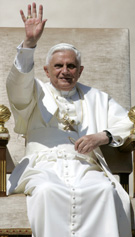For many, the April 19 election of Pope Benedict XVI has been met with caution and visions of hope for the future of the Church.
According to Mark Mossa, S.J., professor of philosophy, Benedict XVI, the Catholic Church’s 265th pontiff, might surprise everybody.
“I don’t think he’ll be as bad as the progressive Catholics might think, nor will he be as conservative as the conservative Catholics might hope,” Mossa said.
The main concern with Benedict XVI as pope is his alleged conservatism and how it will translate into his papacy.
Benedict XVI, who has been dubbed “God’s Rottweiler,” is rumored to be a strict theologian.
For Deborah Halter, instructor of religious studies, Benedict XVI is “persistently viewed as being insensitive or closed to views that are not in line with his own.”
According to Halter, Benedict XVI controlled the Vatican’s agenda, silenced nonconformist theologians and suppressed dissent.
“His heavy hand surely will underscore the divisions among Catholics regarding disputed teachings, especially if he continues to condemn related discussions,” Halter said. “His papacy will affect the Church insofar as he closes doors or opens them.”
However, Benedict XVI’s bad reputation is a result of his position as the head of the Congregation of the Doctrine of the Faith, Mossa said.
“[Benedict XVI] has become defined by the role he had,” Mossa said. “He was part of a group that went after people who defied the Church’s teachings, but he didn’t necessarily want that job. He tried repeatedly to retire from it, but Pope John Paul II wouldn’t allow it.”
Because of Benedict XVI’s alleged conservatism, most people are concerned with how he will treat the controversies surrounding the Church, most notably the issues of homosexuality, women in the Church and the sex abuse scandals.
Bret Pennison, management junior and co-president of Etcetera, is still unsure of the extent of Benedict XVI’s effect on the Church’s stance on homosexuality.
“I don’t think he’ll do too much to change things, for better or for worse,” Pennison said.
Pennison acknowledged the Church’s stance on homosexuality may worsen, but said that all the world can do is wait.
“It’s not unknown for a new pope to change after he is officially installed,” Pennison said. “The letter he sent to the Rabbi of Rome stating that he wishes to keep lines of communication between the faiths open, as was started by Pope John Paul II, is a good sign.”
Another issue Benedict XVI will face is the idea of women becoming fully active in the sacramental ministry and Church leadership.
According to Suzanne Dietzel, director of the women’s resource center, the Church is suffering from a personnel problem, which needs to be addressed.
“There are churches in Latin America that only see their priests twice a year – for marriage and baptism,” Dietzel said. “[Benedict XVI] either needs to say women can’t be in the priesthood, although they can in other denominations, or you have to open the priesthood to women.”
Dietzel said some women are content with their role in the Church, but if that is the case, Benedict XVI still needs to discover Catholic women’s contentment on his own.
“I hope for an open dialogue, listening and a meeting of the Church’s constituents’ needs,” Dietzel said.
Halter does not believe Benedict XVI will change the female role in the Church.
“Unless the new pope has a dramatic conversion, he likely will uphold the teaching that in calling persons to the priesthood, God is more concerned with biology than spirituality,” Halter explained.
The third major issue Benedict XVI will face is the sex abuse scandals within the Church. Mossa said he is confident that Benedict XVI will address the scandals because he served on the department in Rome that was handling them.
“Of all the people in the Vatican, [Benedict XVI] knows the most about the scandals,” Mossa said. “He called them his Friday penance because the department looked at the cases on Fridays.”
According to the Rev. Peter Bernardi, S.J., associate professor of religious studies, Benedict XVI’s papal name is also a good sign of what the world can expect from his papacy.
“The original St. Benedict was the founder of western monasticism, which kept Christianity alive during the centuries of decline following the fall of the Western Roman Empire,” Bernardi wrote in an e-mail.
Mossa also pointed to the positive allusion of the name Benedict.
“Benedict XV was the pope during the first world war,” Mossa said. “He tried to promote a plan for peace, which might have prevented the second world war if it had been adopted. [Benedict XVI] wants to align himself with that image.”
Sarah Castagnetta can be reached at [email protected].








